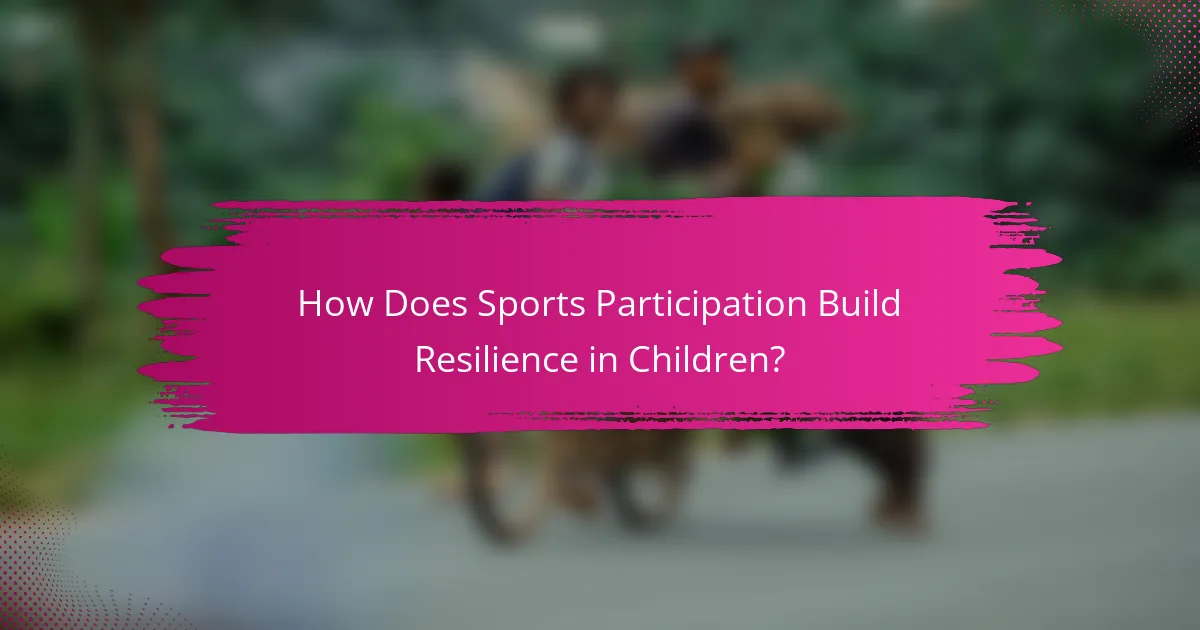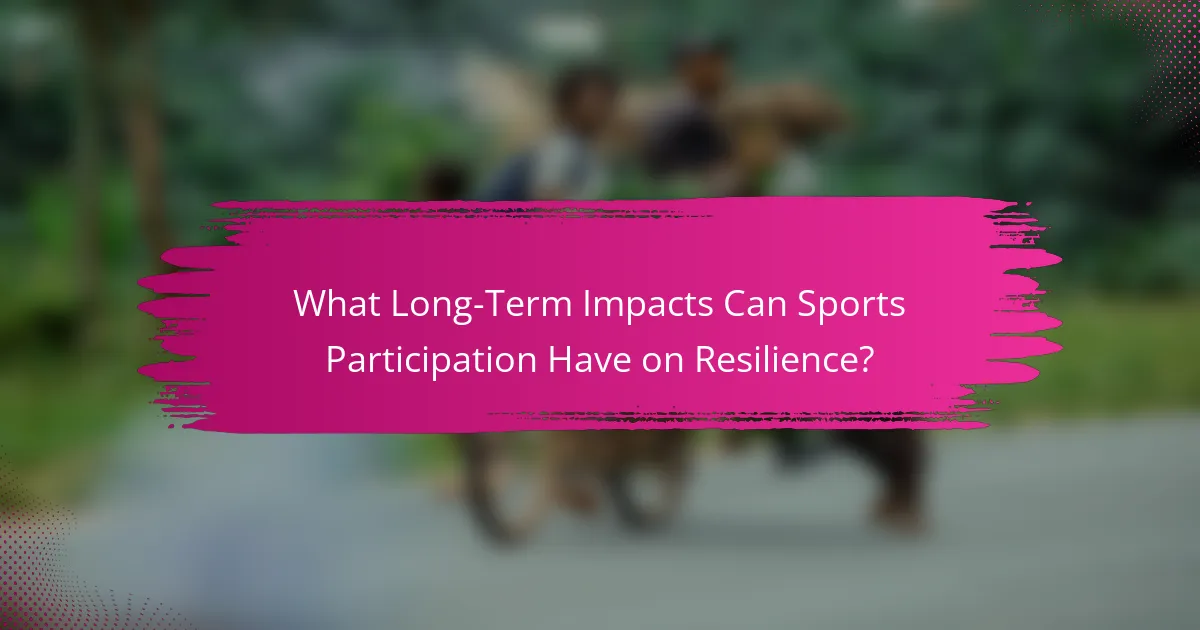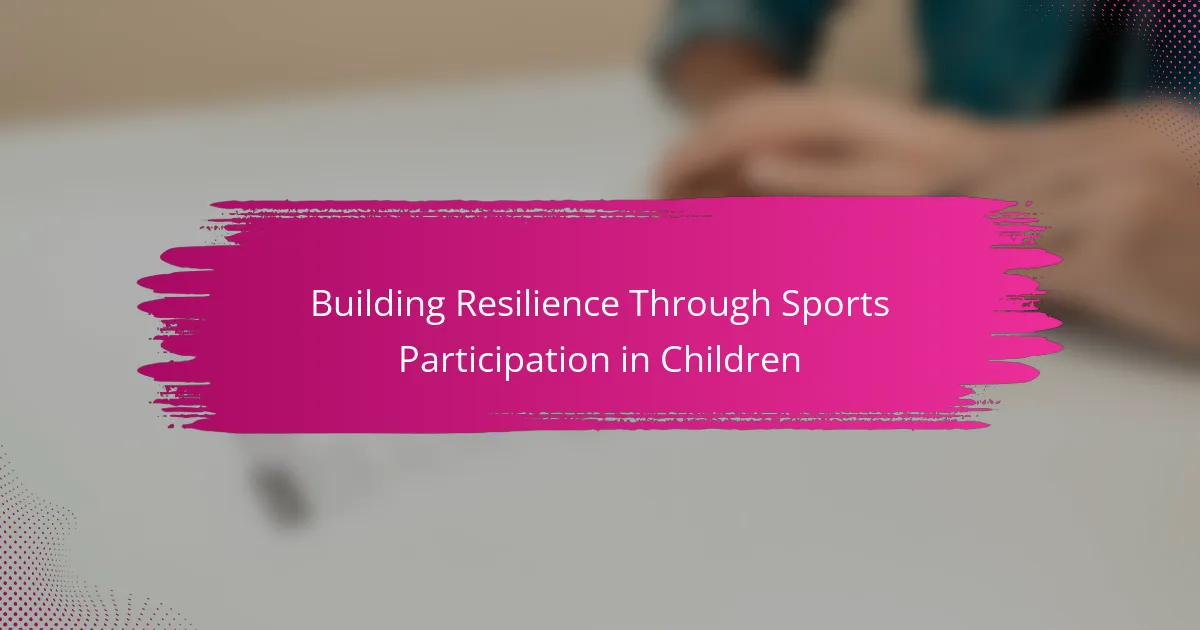Building resilience through sports participation in children is essential for their development. Engaging in sports fosters teamwork, discipline, and coping skills. Parents can create supportive environments to encourage participation and model active behaviour. Regional variations in sports access also impact children’s involvement and resilience.

How Does Sports Participation Build Resilience in Children?
Sports participation builds resilience in children by fostering teamwork, discipline, and coping skills. Engaging in sports teaches children to handle setbacks and develop a strong work ethic. For instance, children learn to persevere through losses, enhancing their ability to face challenges in life. Additionally, social interactions in team sports cultivate emotional intelligence, allowing children to communicate effectively and build supportive relationships. These experiences contribute to a robust sense of self and improved mental health, promoting long-term resilience.
What Are the Universal Benefits of Sports for Child Development?
Participating in sports significantly boosts resilience in children. It teaches them to face challenges, handle setbacks, and develop coping strategies. Engaging in competitive environments fosters a growth mindset, encouraging persistence and adaptability. Research indicates that children involved in sports demonstrate improved emotional regulation and social skills, promoting overall well-being. Regular participation can lead to lifelong benefits, including enhanced self-esteem and confidence.
How Do Physical Skills Enhance Emotional Resilience?
Physical skills enhance emotional resilience by promoting confidence, self-discipline, and stress management in children. Engaging in sports provides a structured environment where children learn to cope with challenges. For instance, mastering a new skill or overcoming a defeat fosters perseverance. Research indicates that children involved in sports demonstrate better emotional regulation and social skills, contributing to overall mental well-being. Furthermore, physical activity releases endorphins, which can improve mood and reduce anxiety levels.
What Role Does Teamwork Play in Developing Social Skills?
Teamwork significantly enhances social skills in children by fostering communication, cooperation, and empathy. Engaging in sports teaches children to interact with peers, resolve conflicts, and develop leadership qualities. These experiences build resilience, as children learn to face challenges together, promoting emotional growth and stronger social connections. Team sports provide a unique attribute by creating a shared goal, encouraging collaboration and mutual support, which are essential for developing effective social skills.
What Unique Attributes Contribute to Resilience Through Sports?
Participation in sports fosters resilience in children through unique attributes such as teamwork, goal-setting, and adaptability. Teamwork teaches collaboration and communication, essential for overcoming challenges. Goal-setting instills a sense of purpose and achievement, motivating children to persist through difficulties. Adaptability enhances their ability to cope with change and setbacks, crucial for developing a resilient mindset. These attributes collectively contribute to a strong foundation for emotional and psychological resilience in young athletes.
How Does Competitive Play Foster a Growth Mindset?
Competitive play fosters a growth mindset by encouraging children to embrace challenges and learn from failures. Engaging in sports teaches resilience, as children face setbacks and must adapt their strategies. This process builds confidence and promotes a positive attitude towards learning. Research indicates that children who participate in competitive sports develop better problem-solving skills, enhancing their ability to overcome obstacles. These experiences create a foundation for lifelong learning and adaptability.
What Specific Sports Are Most Effective for Building Resilience?
Team sports like football and basketball are most effective for building resilience in children. These activities promote teamwork, communication, and problem-solving skills. Individual sports such as martial arts also enhance resilience by teaching self-discipline and perseverance. Engaging in diverse sports fosters adaptability, a key trait of resilience. Studies indicate that children participating in sports show improved emotional regulation and coping strategies, further solidifying their resilience.
What Rare Attributes May Influence Resilience Development?
Rare attributes that may influence resilience development through sports participation in children include unique social dynamics, individual personality traits, and access to supportive environments. For instance, children with strong social connections in sports often exhibit greater emotional resilience. Additionally, personality traits such as optimism can enhance a child’s ability to cope with challenges in sports. Access to supportive coaching and family involvement also plays a crucial role in fostering resilience. These factors highlight the complex interplay between individual characteristics and environmental influences in building resilience through sports.
How Can Individual Sports Impact Self-Esteem Differently?
Individual sports can significantly enhance self-esteem in children by fostering independence and personal achievement. Participation in these sports allows children to set and reach personal goals, which builds confidence. For instance, mastering a new skill in tennis or gymnastics can lead to a profound sense of accomplishment.
Moreover, engaging in individual sports promotes resilience by teaching children how to cope with failure and setbacks. They learn to push through challenges independently, which can translate to improved self-worth. Studies indicate that children involved in such sports often exhibit higher self-esteem compared to those in team sports, as they experience direct ownership of their successes and failures.
Additionally, individual sports can provide a unique platform for self-expression. This aspect can be particularly beneficial for children who may struggle in social settings. The focus on personal performance rather than competition against others can create a positive self-image and encourage a healthy self-concept.
Overall, the impact of individual sports on self-esteem is profound, as they cultivate resilience, independence, and self-expression in children.
What Are the Cultural Factors Affecting Sports Participation?
Cultural factors significantly influence sports participation among children. These factors include societal attitudes, family support, and access to facilities. For instance, communities that prioritise physical activity often see higher engagement in sports. Additionally, cultural norms can dictate which sports are played and by whom, affecting gender participation. Access to resources, such as coaching and equipment, also plays a crucial role in fostering resilience through sports.

What Strategies Can Parents Use to Encourage Sports Participation?
Parents can encourage sports participation by creating a supportive environment and fostering intrinsic motivation. Establishing routines that prioritise physical activity helps children view sports as a regular part of life. Encouraging teamwork and social connections through group activities builds resilience and confidence.
Additionally, parents should model active behaviour by participating in sports themselves. Offering praise for effort rather than outcome reinforces a growth mindset. Providing diverse sports options allows children to explore interests, leading to sustained engagement.
By emphasising fun and personal growth, parents can instil a lifelong appreciation for sports, which enhances resilience and overall well-being in children.
How Can Parents Identify the Right Sports for Their Children?
Parents can identify the right sports for their children by considering their interests, physical abilities, and personality traits. Understanding a child’s unique attributes, such as their energy levels and social preferences, can guide this process. Observing their reactions to various sports can provide insights into what they enjoy most. Additionally, introducing them to different activities can help assess their resilience and adaptability, which are crucial for building character through sports participation. Engaging with coaches and other parents can also offer valuable perspectives on suitable options for each child.
What Are Common Mistakes Parents Make in Supporting Sports Participation?
Common mistakes parents make include overemphasising winning, pressuring children, and neglecting enjoyment. These actions can hinder resilience development. Encouraging a supportive environment fosters not only athletic skills but also emotional strength. Parents should focus on process over outcome to promote long-term participation.
What Expert Insights Can Help Maximise the Benefits of Sports?
Engaging in sports can significantly enhance resilience in children. Expert insights emphasise the importance of structured activities that promote teamwork, discipline, and perseverance. Research indicates that children who participate in sports develop better coping strategies, which helps them handle stress and setbacks effectively.
Moreover, physical activity fosters a sense of achievement, boosting self-esteem and confidence. Coaches and parents can maximise these benefits by encouraging a growth mindset, focusing on effort rather than just outcomes. As a result, children learn to embrace challenges, further building their resilience.

How Does Sports Participation Vary Across Different Regions?
Sports participation varies significantly across regions due to cultural, economic, and environmental factors. In regions with strong sports infrastructure, children engage more frequently in organised activities, enhancing resilience and teamwork skills. Conversely, areas with limited resources may see lower participation rates, impacting children’s physical and social development. For example, urban environments often provide more access to facilities compared to rural areas. Additionally, cultural attitudes towards sports influence participation levels, with some regions prioritising sports more than others. These variations illustrate the diverse landscape of children’s sports involvement globally.
What Local Trends Influence Sports Participation in Children?
Local trends significantly influence children’s sports participation by shaping their access, motivation, and social engagement. Increased urbanisation often leads to more organised sports programmes, fostering community involvement. Additionally, rising health awareness encourages parents to enrol children in physical activities, promoting resilience through teamwork and competition. Schools play a crucial role by integrating sports into curricula, enhancing participation rates. Furthermore, cultural shifts towards inclusivity in sports create diverse opportunities, allowing children from various backgrounds to engage and thrive.
How Do Cultural Attitudes Toward Sports Affect Resilience Building?
Cultural attitudes toward sports significantly influence resilience building in children. Positive perceptions of sports foster teamwork and perseverance, essential traits for overcoming challenges. For instance, cultures that value competitive sports encourage children to face adversity, enhancing their coping strategies. In contrast, cultures that prioritise individual achievement may lead to increased pressure, potentially hindering resilience. Ultimately, the integration of sports into cultural frameworks shapes children’s ability to navigate obstacles, contributing to their overall development.

What Long-Term Impacts Can Sports Participation Have on Resilience?
Sports participation significantly enhances children’s resilience over the long term. Engaging in sports fosters essential life skills such as teamwork, discipline, and stress management. These experiences contribute to emotional regulation and adaptability in challenging situations.
Research indicates that children involved in sports are better equipped to handle setbacks, as they learn to cope with both wins and losses. This unique attribute of sports participation cultivates a growth mindset, encouraging perseverance and determination. Additionally, sports provide a supportive community, further reinforcing resilience through social connections and shared experiences.
As a result, the long-term impacts of sports participation on resilience are profound, promoting mental well-being and equipping children with tools to navigate life’s challenges effectively.
How Can Early Sports Involvement Shape Future Success?
Early sports involvement fosters resilience, leading to future success in various life aspects. Engaging in sports teaches children to cope with challenges, manage stress, and develop a growth mindset. Research indicates that children who participate in sports exhibit improved problem-solving skills and adaptability, critical traits for success. Moreover, teamwork and social interaction in sports enhance communication skills, further contributing to personal and professional achievements. These foundational experiences in sports create a strong basis for resilience, shaping well-rounded individuals prepared for future endeavours.
What Evidence Supports the Link Between Sports and Resilience in Adulthood?
Sports participation in childhood significantly enhances resilience in adulthood. Engaging in sports fosters essential life skills such as teamwork, discipline, and stress management. Research indicates that children involved in sports develop coping mechanisms that translate into adult resilience. For instance, a study found that athletes exhibit higher levels of emotional regulation and problem-solving skills, key components of resilience. Furthermore, sports provide a unique environment where children learn to face challenges and setbacks, preparing them for future adversities.


